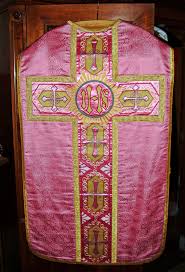On the fourth Sunday of Lent, we look at the Davidic covenant that, like the previous ones, was not respected; it was eventually replaced by the New Covenant, with the coming of Jesus Christ, Son of David, as the Light of the world.
Today is also called Laetare Sunday, from the first few words of the traditional Latin entrance verse for the Mass of the day. ‘Laetare Jerusalem’ (‘Rejoice, O Jerusalem’) is Latin from Isaiah 66: 10.
In the First Reading (2 Chron 36: 14-16. 19-23) we see that the people of Judah had failed to keep the covenant; they had ‘polluted the house of the Lord’ and mocked at God’s messengers. Then the inevitable happened. In 597 BC, King Nebuchadnezzar II of Babylon captured Jerusalem and sent the king and his people into exile. For 70 years thereafter, they turned to God in their desolation and kept sabbath holy. Eventually, God in His mercy inspired the Persian king Cyrus, who had by then conquered Babylon, to let the Jews return to Judah and rebuild the Temple that the Babylonians had destroyed.
This Second Temple was awe-inspiring from the religious as well as architectural point of view. But alas, it was only a marvellous shell disguising the emptiness of the people’s lives. Not only did Judah continue to be coveted by foreign rulers, including the Greeks and the Romans; to curry favour with the authorities, the Jews were willing to offer sacrifices to their deities. Herod even erected a golden Roman eagle on the Temple. The Pharisees rose partly as a reaction to the Jewish submission to foreign influences and syncretistic practices (but eventually the remedy became as serious as the disease)….
It was against this background that, five centuries later, God sent His Only Son Jesus to announce the Good News of Salvation. Jesus frequented that very Temple, preached there and even cried at the thought of its impending destruction. He presented Himself as the Temple of God – but He was misunderstood, maligned, rejected. When He promised to rebuild the Temple in three days, He was referring to His own Death and Resurrection. But the people who cared not to see beyond the end of their noses wrote Him off. And the rest is history. Jesus built His Holy Church, to which we are happy to belong, whereas in 70 AD the Jewish Temple was reduced to rubble by the Romans and there began the dispersion of the Jews.
That throws into sharp focus what Jesus says to Nicodemus in today’s Gospel text (Jn 3: 14-21): ‘As Moses lifted up the serpent in the wilderness, so must the Son of God be lifted up, that whoever believes in Him may have eternal life.’ And then He cautions: ‘He who believes in Him is not condemned; he who does not believe is condemned already, because he has not believed in the name of the Only Son of God.’

It is interesting to note that Nicodemus was a Pharisee and member of the Sanhedrin; he, who admired Jesus’ teachings, first visited Him at night! He was quite likely a secret disciple and is known to have reminded fellow members that Jesus had a right to a hearing before being judged. He appeared next after Jesus’ crucifixion, bringing along the customary spices to anoint the dead body – a large amount at that, which turned it into a “royal burial”,[1] in the words of Pope Benedict XVI, in his book Jesus of Nazareth.
Meanwhile, what is that ‘serpent in the wilderness’ that Jesus refers to in his conversation with Nicodemus? It refers to a scene from Numbers 21, where the Lord had told Moses to lift up a pole with a bronze serpent on it, so that whoever looked upon it would be healed and delivered from God’s judgment.
Likewise, we must regard Jesus on the Cross as our only salvation! But do we? It isn’t an exaggeration to say that the Christian world stands in need of liberation from many temptations and vices. It is as though we too have ‘polluted the house of the Lord’; we are indeed walking the tightrope with syncretic and idolatrous practices, putting the Lord to the test. We are destined to have a share in the kingdom of God, in God’s eternal life, yet we go to pick up two pennies in the street, risking the loss of that great fortune.
Let us not be half-hearted or just secret admirers of Jesus Christ. Let us come out into the open and declare our allegiance and solidarity. Rightly so, for with Him we have everything; without Him, nothing! Without Him, we would be condemned and dead already. St Paul in the Second Reading (Eph 2: 4-10) calls our attention to the fact that ‘God, who is rich in mercy, out of the great love with which He loved us, even when we were dead through our trespasses, made us alive together with Christ (by grace you have been saved), and raised us up with Him.’ He is indeed the Way, the Truth and the Life. He is the Light.
Let us be children of the Light and love Him who is the Light of the World. Only then will the New and Eternal Jerusalem rejoice.
[1] Ratzinger, Joseph. Jesus of Nazareth. Holy Week: from the entrance into Jerusalem to the Resurrection. California: Ignatius Press, and Bangalore: Asian Trading Corporation, 2011, p. 228.